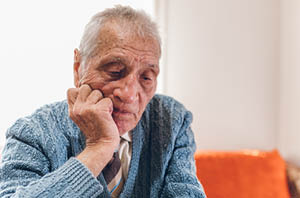Q. My 91-year-old father lives on his own and has been living alone since my mother died five years ago. He looked rather thin last time we saw him. I am concerned about his nutrition. Should I be worried?
A. This is a very common concern for many families. It can be a sign of a bigger issue and should be taken seriously. Other red flags can be a loss of appetite, forgetfulness, or decrease in strength and the ability to get around. Below are some of the common causes as well as steps to take to prevent weight loss. If you notice signs of weight loss, it’s important to discuss with a provider and get an evaluation.
Unexplained Weight Loss: What is It?
Unintentional weight loss means dropping weight without doing so deliberately.
Weight loss is common among older adults with approximately 25% of older adults experience unexpected weight loss.
While sometimes medical conditions can be a factor, oftentimes there is no explanation for sudden weight loss in older populations.
Unexplained weight loss happens when a person has lost considerable weight within six to 12 months with no intention of losing weight, and the weight loss is not the result of changes in lifestyle or eating habits. Unplanned weight loss may indicate a severe health condition, so it’s best to know the signs.

Common Causes of Sudden Weight Loss
1. Physiological Problems
A physical examination is a crucial part of diagnosing unhealthy weight loss. Many factors can contribute to an unintentional weight loss in your loved one. Chronic health conditions can trigger weight loss in seniors, affecting metabolism and changing their eating habits. Hence, you must factor known health conditions into your investigation that may result in chemical imbalances.
Among the most common conditions that may affect sudden weight loss are:
- Hyperthyroidism
- Cancer
- Alzheimer’s or Dementia
- Gastrointestinal Issues
- Diabetes
- Heart Disease
Besides these conditions, there are plenty of other physical reasons people lose weight. Mobility issues may play a significant role. As a result, people with limited mobility lose more muscle mass than fat.
2. Side Effects of Medication
Medication side effects can cause weight loss in elderly adults. Research shows that medications can affect a person’s weight, diet, and appetite by the following means:
- Drugs can alter the sense of taste or smell in a patient
- Patients may experience dry mouth due to these drugs
- A patient may develop anorexia as a result of medication
- Some medicines can cause nausea and vomiting in patients
- Dysphagia can make swallowing painful, difficult, or even impossible
3. Psychological Issues
As mentioned earlier, diseases such as Alzheimer’s and other forms of dementia that affect cognition can result in unplanned weight loss. Alzheimer’s patients’ eating habits can change significantly due to various disease symptoms.
Older adults who suffer from depression can unintentionally lose weight. Depression makes people feel fatigued, therefore unable to care for themselves properly. It is crucial to monitor depression-related factors, such as grieving, losing independence, and experiencing chronic pain that may serve as indicators of depression.
An underlying condition such as a mood disorder may cause rapid weight loss and worsen issues.
4. Social Concerns
Compared to the three issues above, social problems can be more challenging to detect. Social conditions are hard to diagnose due partly to their subtle nature and close friends and family members might not see the issues for what they are. A major contributing factor to weight loss is social isolation, where people lose track of their healthy habits due to depression and a lack of available social contacts to compare life experiences with.
A caregiver serves as an essential point of contact for prevention. But the caregiver must be qualified, and if they are not professionals, they must have the time to support the patient.
5. Other Concerns
- Financial constraints. Are they able to afford the foods, order them, and prepare healthy meals? Who does the shopping? Who does the cooking?
- Pain or discomfort. Is there any pain when trying to swallow or chew? Nausea, vomiting, or feeling full quickly? Abdominal pain? Constipation or diarrhea?
What is the Treatment for Unexplained Weight Loss?
Identifying the underlying cause of unexplained weight loss is the first step in treating it. Please contact your provider to schedule a complete physical exam.
Additional diagnostic testing may be ordered or your provider may refer you to a specialist. If the cause of the weight loss is determined, and the underlying condition treated, body mass can return.
In the absence of an underlying problem, their provider may recommend a monitoring approach, in addition to a special diet. The provider may refer them to a dietitian for help to increase calorie intake, or recommend that food is flavored to make it more appealing to eat.
10 Tips for Seniors to Maintain a Healthy Weight
While unintentional weight loss is common among older adults, there are steps to take to prevent weight loss and maintain a healthy weight through aging.
- Exercise regularly
- Incorporate strength training
- Eat breakfast
- Choose foods that are high in protein
- Eat foods that are high in fiber (i.e. whole grain bread, beans, vegetables, fruit)
- Limit sugars and other “empty calories”
- Stay hydrated
- Build strong relationships with family and friends
- Join an exercise group
- Prioritize sleep
How Stellis Health Can Help
Stellis Health has a team of more than 60 primary and specialty physicians, physician assistants, and nurse practitioners, so you’ll be in good hands no matter your health concerns.
Schedule an appointment today and prioritize your health.

